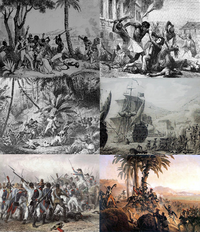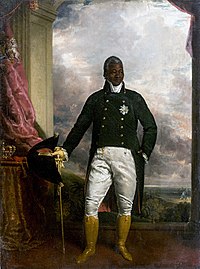-
Use Cases
-
Resources
-
Pricing
Haitian Revolution Timeline
(1791 - 1804)Background and Causes
Influence of Enlightenment Ideas
1700 - 1799
% complete
Enlightenment ideals, including notions of natural rights and the equality of all individuals, played a significant role in inspiring the enslaved population of Saint-Domingue to fight for their freedom during the Haitian Revolution.
Impact of the American Revolution
1775 - 1783
% complete
The American Revolution and its ideals of liberty and independence had a significant impact on the Haitian Revolution. The success of the American colonies in their fight against British colonial rule served as an inspiration for the enslaved population in Saint-Domingue.
Influence of French Revolution
1789 - 1799
% complete
The ideas and principles of the French Revolution, such as liberty, equality, and fraternity, had a significant influence on the Haitian Revolution. The revolutionary spirit and the abolition of slavery in France provided inspiration and ideological support for the enslaved population in Saint-Domingue.
Slave Revolt in Saint-Domingue
Aug 22, 1791
% complete
The Haitian Revolution began with a massive slave revolt in Saint-Domingue (present-day Haiti) on August 22, 1791. Enslaved Africans, inspired by the ideals of the French Revolution and the desire for freedom, initiated a widespread rebellion against the oppressive plantation system.
Image source: Haitian Revolution

Revolutionary Uprisings and Leadership
Toussaint Louverture Assumes Leadership
May 20, 1794
% complete
Toussaint Louverture, a former slave and military leader, emerged as a prominent figure in the Haitian Revolution. He assumed leadership in May 1794 and played a crucial role in uniting the revolutionaries and leading the fight against the French colonial forces.
François-Dominique Toussaint Louverture's Capture
Jun 7, 1802
% complete
François-Dominique Toussaint Louverture, the leader of the Haitian Revolution, was captured by French forces on June 7, 1802. His capture marked a turning point in the revolution and led to increased conflict and resistance against the French colonial rule.
Image source: Toussaint Louverture

Jean-Jacques Dessalines Proclaims Emperor
Oct 6, 1804
% complete
Following Haiti's independence, Jean-Jacques Dessalines proclaimed himself Emperor Jacques I on October 6, 1804. This marked a shift in leadership and governance in Haiti, with Dessalines becoming the first ruler of the newly established Haitian Empire.
Image source: Jean-Jacques Dessalines

Henri Christophe Establishes Kingdom
Mar 28, 1811
% complete
Henri Christophe, a military leader during the Haitian Revolution, established a separate kingdom in northern Haiti on March 28, 1811. His rule marked a distinct period in Haitian history and represented a different approach to governance after the revolution.
Image source: Henri Christophe

Major Battles and Conflicts
Battle of Crête-à-Pierrot
Mar 4, 1802 - Apr 24, 1802
% complete
The Battle of Crête-à-Pierrot was a significant conflict during the Haitian Revolution. Haitian forces, led by Jean-Jacques Dessalines, defended the fortress of Crête-à-Pierrot against the French army for over a month, showcasing their determination and resilience in the face of colonial forces.
Image source: Battle of Crête-à-Pierrot

Battle of Ravine-à-Couleuvres
Mar 22, 1802 - Mar 23, 1802
% complete
The Battle of Ravine-à-Couleuvres was a significant engagement during the Haitian Revolution. Haitian forces, led by Jean-Jacques Dessalines, successfully defended their positions against the French army, showcasing their military prowess and determination.
Image source: Battle of Ravine-à-Couleuvres

Battle of Vertières
Nov 18, 1803
% complete
The Battle of Vertières was a decisive conflict in the Haitian Revolution. Haitian forces, led by Jean-Jacques Dessalines, defeated the French army on November 18, 1803, marking a significant victory and ultimately leading to the end of French colonial rule in Haiti.
Image source: Battle of Vertières

Battle of San Domingo
Feb 6, 1806
% complete
The Battle of San Domingo was a naval battle during the Haitian Revolution. The French navy, led by Admiral Louis-René Levassor de Latouche Tréville, defeated the Haitian fleet on February 6, 1806, reaffirming French control over the seas and limiting Haiti's ability to expand its influence.
Image source: Battle of San Domingo

Independence and Legacy
Declaration of Independence
Jan 1, 1804
% complete
On January 1, 1804, Haiti declared its independence from France, becoming the first independent black republic in the world. This declaration marked a historic moment in the fight against slavery and colonialism, inspiring other anti-colonial movements and shaping the legacy of the Haitian Revolution.
Image source: Haitian Declaration of Independence

Abolition of Slavery in Haiti
Jan 1, 1804
% complete
The Haitian Revolution resulted in the abolition of slavery in Haiti, making it the first nation in the world to completely abolish slavery. This achievement had a profound impact on the global struggle against slavery and served as an inspiration for future abolitionist movements.
Image source: Abolitionism

Economic Blockade by European Powers
1825 - 1838
% complete
After Haiti gained independence, European powers, particularly France, imposed an economic blockade on the country. This blockade, lasting from 1825 to 1838, aimed to cripple Haiti's economy and force the payment of reparations to France, resulting in economic challenges that hindered the nation's development.
Key Facts
- The revolution began with a slave revolt in 1791 led by Toussaint L'Ouverture.
- Toussaint L'Ouverture emerged as a prominent leader and effectively organized the rebel forces.
- In 1804, Haiti declared its independence from France, becoming the first independent black republic in the world.
- The revolution had a profound impact on the abolitionist movement and inspired enslaved people across the Americas to fight for their freedom.
- The Haitian Revolution challenged the prevailing notions of racial hierarchy and colonial power dynamics.
Source
This Haitian Revolution timeline was generated with the help of AI using information found on the internet.
We strive to make these timelines as accurate as possible, but occasionally inaccurates slip in. If you notice anything amiss, let us know at [email protected] and we'll correct it for future visitors.
Create a timeline like this one for free
Preceden lets you create stunning timelines using AI or manually.
Customize your timeline with one of our low-cost paid plans
Export your timeline, add your own events, edit or remove AI-generated events, and much more
Free
$
0
free forever
No credit card required.
Basic
$
10
/month
billed annually
Cancel anytime.
Pro
$
16
/month
billed annually
Cancel anytime.
Common Questions
Can I cancel anytime?
Yes. You can cancel your subscription from your account page at anytime which will ensure you are not charged again. If you cancel you can still access your subscription for the full time period you paid for.
Will you send an annual renewal reminder?
Yes, we will email you a reminder prior to the annual renewal and will also email you a receipt.
Do you offer refunds?
Yes. You can email us within 15 days of any payment and we will issue you a full refund.
What if I have more questions?
Check out our pricing docs or send us an email anytime: [email protected].